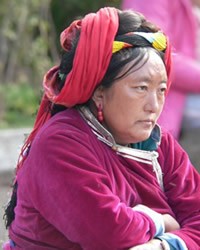Chrame in China

Photo Source:
Anonymous
|
Send Joshua Project a map of this people group.
|
| People Name: | Chrame |
| Country: | China |
| 10/40 Window: | Yes |
| Population: | 50,000 |
| World Population: | 50,000 |
| Primary Language: | Pumi, Northern |
| Primary Religion: | Buddhism |
| Christian Adherents: | 0.00 % |
| Evangelicals: | 0.00 % |
| Scripture: | Translation Started |
| Ministry Resources: | No |
| Jesus Film: | No |
| Audio Recordings: | Yes |
| People Cluster: | Tibetan |
| Affinity Bloc: | Tibetan-Himalayan Peoples |
| Progress Level: |
|
Introduction / History
Muli was formerly a Buddhist monastery town presided over by a king until the 1950s. "The rulers of Muli are said to be of Manchu origin. They were given the sovereignty of the kingdom in perpetuity in recognition of valorous services rendered to Yungcheng, the famous Manchu emperor, who ascended the throne in 1723." In the past the Chrame were often attacked by Nosu raiders from the east. The Chrame king ruled with "absolute spiritual and temporal sway" over his subjects. "The villagers occupy wooden shanties scattered over the hillsides below the town. They are very poor and live in constant fear of the lama king and his parasitic satellites."
The self-named Chrame were commonly known in the past as Xifan, a derogatory Chinese name meaning "barbarians of the west." It was a name not only applied to this group but sometimes also used for all Tibetans. The Chrame "are a member of the Tibetan minzu [nationality], but feel they have little in common with the Tibetans."
What Are Their Lives Like?
The Muli people practice both monogomay (one man with one wife and polyandry (brothers sharing the same wife).
What Are Their Beliefs?
All Chrame adhere to Tibetan Buddhism. It forms a major part of their ethnic and cultural identity. The Chrame inwardly long for the restoration of their kingdom and their former prestige among the other peoples of the area.
What Are Their Needs?
The Chrame are one of the most unreached people groups in China. The Baptist missionaries Dan and Lucy Carr planned to work in Muli in the late 1940s, but they were evacuated from China before they had the opportunity to move there.
Prayer Points
Pray that the Lord will intervene in their families, calling people to his side.
Pray for loving, Holy Spirit led workers.
Pray that their hearts will be drawn to the Lord of lords.
Pray that a church planting movement will thrive in their communities.